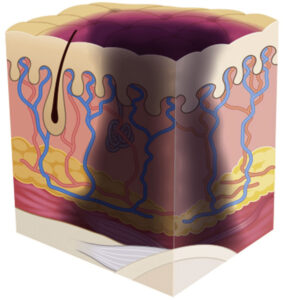
Understanding Deep Tissue Injuries
Deep tissue injuries (DTIs) occur when underlying tissue, such as muscles or fascia, is damaged while the skin remains intact. These injuries often result from sustained pressure or trauma, leading to significant discomfort and potential complications if not properly managed.
Symptoms of Deep Tissue Pressure Injuries
Recognizing the symptoms of DTIs is crucial for early intervention. Common signs include:
- Discolored skin, typically purple or maroon.
- Pain in the affected area.
- A firm, mushy, or boggy feel to the tissue.
- Temperature changes in the skin, such as warmth or coolness.
Risk Factors
Several factors can increase the risk of developing deep tissue injuries:
- Prolonged pressure on the skin, often from immobility.
- Poor nutrition and hydration.
- Advanced age, which reduces skin elasticity.
- Medical conditions like diabetes or vascular diseases that impair circulation.
- Incontinence, leading to skin moisture and increased susceptibility to injury.
Complications of Deep Tissue Injuries
Without timely and appropriate treatment, DTIs can lead to severe complications:
- Infection: Bacteria can infiltrate the damaged tissue, causing infections that might spread to other areas.
- Ulceration: The injured tissue can break down, leading to open wounds that are challenging to heal.
- Increased Pain: Persistent and worsening pain can occur as the injury progresses.
- Reduced Mobility: Severe injuries can impair movement and function, particularly in areas like the hips, back, or heels.
Treatments of Deep Tissue Pressure Injuries
Effective treatment of DTIs involves a combination of medical and supportive care:
- Pressure Relief: Regularly repositioning patients to alleviate pressure on vulnerable areas.
- Wound Care: Cleaning and dressing wounds to prevent infection and promote healing.
- Nutrition and Hydration: Ensuring adequate intake of nutrients and fluids to support tissue repair.
- Medications: Pain relief and antibiotics if an infection is present.
- Advanced Therapies: Techniques such as negative pressure wound therapy (NPWT) and hyperbaric oxygen therapy (HBOT) to enhance healing.
Dealing with a deep tissue injury requires expert care. Contact DFW Wound Care Center, where we have immediate openings and are accepting new patients at our four clinics. Utilizing advanced wound care techniques at multiple locations, including Plano, Lewisville, Irving, and DeSoto, our skilled team addresses the unique needs of each patient. Reach out today for specialized care tailored to your specific condition!
Contact us
Schedule an appointment
with our specialists by contacting us or calling our:
